"Where the Yarrow Grows There Is One Who Knows"~
 "Faierie-Folks Are in Old Oaks." Old Herbal Saying
"Faierie-Folks Are in Old Oaks." Old Herbal Saying
My fascination with herbs and herbal lore is largely prompted by my absorption with all things historic and the thrill of seeing, touching, tasting, and above all smelling the same plants known by the ancients. Herbs have changed little, if at all, over the centuries and offer us a connection with the past that precious little does in these modern days. It's pure intoxication to rub fragrant leaves between my fingers and savor the scent while pondering the wealth of lore behind these plants. I hope my enthusiasm enriches your life with a deeper awareness of those people who dwelt on this earth long before us. With such a vast trove of plants to delve into, I've only done posts on a handful of herbs, but am working along on adding more.
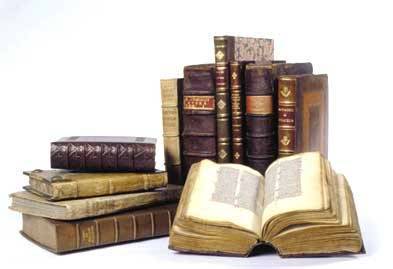 Regarding my resources, my favorite herbal ever, a massive two-part volume, is A Modern Herbal by Mrs. M. Grieve first published in 1931. It's not actually all that modern, but is in comparison to those of the ancient Greek and Roman naturalists, Pliny the Elder (Roman, 23 AD–August 25, 79 AD) Dioscorides (Greek, circa 40—90 AD) and Galen (Roman of Greek ethnicity AD 129-199/217 AD), or British herbalists John Gerard (1545–1612) and Nicholas Culpepper (1616-1654).
Regarding my resources, my favorite herbal ever, a massive two-part volume, is A Modern Herbal by Mrs. M. Grieve first published in 1931. It's not actually all that modern, but is in comparison to those of the ancient Greek and Roman naturalists, Pliny the Elder (Roman, 23 AD–August 25, 79 AD) Dioscorides (Greek, circa 40—90 AD) and Galen (Roman of Greek ethnicity AD 129-199/217 AD), or British herbalists John Gerard (1545–1612) and Nicholas Culpepper (1616-1654).
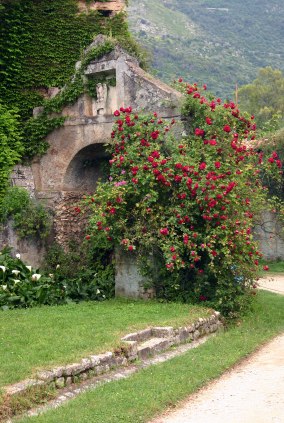 Interesting here to note that Pliny the Elder, whose 37 volume Natural History served as the basis of scientific knowledge for centuries, died on August 25, 79 A.D. while attempting the rescue by ship of a friend and his family from the eruption of Mount Vesuvius that destroyed the cities of Pompeii and Herculaneum. The prevailing wind wouldn't allow his ship to leave the shore. His subsequent collapse and death were attributed to toxic fumes. Go figure. His nephew, Pliny the younger, writer, historian, and Roman senator is also an important figure because of all the letters he left behind detailing events and persons.
Interesting here to note that Pliny the Elder, whose 37 volume Natural History served as the basis of scientific knowledge for centuries, died on August 25, 79 A.D. while attempting the rescue by ship of a friend and his family from the eruption of Mount Vesuvius that destroyed the cities of Pompeii and Herculaneum. The prevailing wind wouldn't allow his ship to leave the shore. His subsequent collapse and death were attributed to toxic fumes. Go figure. His nephew, Pliny the younger, writer, historian, and Roman senator is also an important figure because of all the letters he left behind detailing events and persons.
Back to Maude Grieve and A Modern Herbal, apparently in the early twentieth century it wasn't illegal to include instructions for growing and distilling opiates, but it is now so I won't. However, despite her quaintness or perhaps because of it, there's a wealth of information in her herbal.
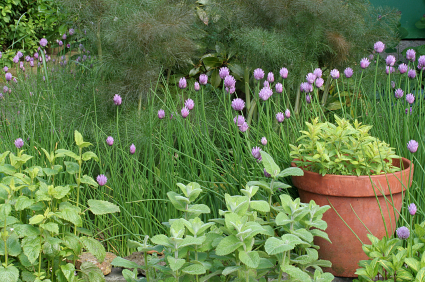 I'm also quite fond of Rodale's Illustrated Encyclopedia of Herbs, by Rodale Press. I misplaced my original volume or foolishly lent it to someone, or perhaps it wasn't mine to begin with and I returned it. All I know is it could not be found and so I bought another. Engrossing.
I'm also quite fond of Rodale's Illustrated Encyclopedia of Herbs, by Rodale Press. I misplaced my original volume or foolishly lent it to someone, or perhaps it wasn't mine to begin with and I returned it. All I know is it could not be found and so I bought another. Engrossing.
A little known volume I've found vastly useful regarding Native American plants and their historic uses is entitled Field Guide to Medicinal Wild Plants by Bradford Angier, published in 1978. This invaluable book was given to me by my dear late grandmother. My collection is a rather random acquisition, but I've learned a lot. OK, so those are my three faves out of all the herbals I've read, available from Amazon and Barnes & Noble. I've also come across innumerable online sites that I refer and link to as they arise.
 In preparation for writing my light paranormal romance, Somewhere My Lass, I did a lot of research on medieval hospitals and came across some fascinating sites. For medicinal info on ancient British/Scottish practices found at the monastic hospital of Soutra outside of Edinburgh visit: A Day In The Life Of A Medieval Hospital.
In preparation for writing my light paranormal romance, Somewhere My Lass, I did a lot of research on medieval hospitals and came across some fascinating sites. For medicinal info on ancient British/Scottish practices found at the monastic hospital of Soutra outside of Edinburgh visit: A Day In The Life Of A Medieval Hospital.
And try: http://www.redorbit.com/news/health/234047/getting_to_the_roots_of_soutras_old_cures/
For more on medieval hospitals in general visit: http://dodd.cmcvellore.ac.in/hom/10%20-%20Medieval%20Hospital.html
"The herb that can't be got is the one that heals,"~Irish Sayings
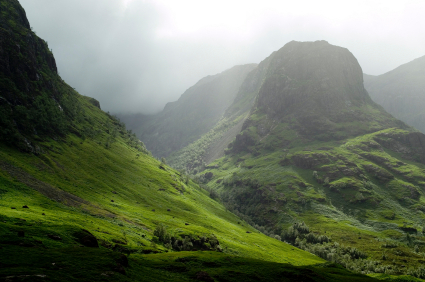 The following herbal excerpt is from Scottish Time Travel Romance Somewhere My Lass:
The following herbal excerpt is from Scottish Time Travel Romance Somewhere My Lass:
Tearing his eyes away from Mora, Neil squirted antibiotic ointment on the deep cut, as he'd often done before, only not to himself. He closed the raw edges of the wound together with a butterfly band aide then covered that with a larger one. "There. That should hold it."
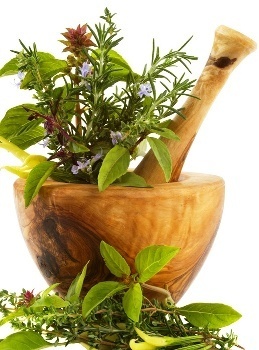 Aunt Margaret observed the proceedings over his shoulder. "Ye know what yer about, I see. No stitches wanted with that wee dressing. There's naught like a healing salve fer wounds. The ground berries of hemlock, yarrow root, and opium seeds mixed with lard make a fine unguent. Yet yers will serve, I doubt not."
Aunt Margaret observed the proceedings over his shoulder. "Ye know what yer about, I see. No stitches wanted with that wee dressing. There's naught like a healing salve fer wounds. The ground berries of hemlock, yarrow root, and opium seeds mixed with lard make a fine unguent. Yet yers will serve, I doubt not."
Pride in her shining eyes, Mora said, "Neil has much knowledge of healing."
He basked in her praise but suspected Margaret Mackenzie knew a great deal herself.
"Aye. He does that. And he'll have need of it."~
Filed under: Uncategorized Tagged: A Modern Herbal, Bradford Angier, Digital time travel romance novel, Health, Herb, Mount Vesuvius, Pliny the Elder, Rodale Inc., Rodale Press, Rodale's Illustrated Encyclopedia of Herbs, Scottish time travel romance excerpt, suspenseful Scottish time travel











